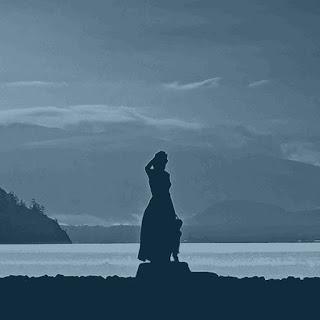The chief protagonist, Ellida, is the daughter of a lighthouse keeper in one of the beautiful and mysterious Norwegian fjords. One day, when she was still a young girl, a visiting ship needed some repair and moored at a nearby fishing village. The second officer, wanting to kill time on his free day, visited the lighthouse. There, he met Ellida and was captivated by her beauty. While his ship was still undergoing repairs, he had a quarrel with his captain and in the ensuing fight he killed him. As flew the scene of crime, the man made his way to the lighthouse. He then forced Ellida to assist in his flight. Before leaving, in a strange ceremony of betrothal, he fastened their two rings and cast them into the sea. After he left, Ellida wrote to him saying she would not consider the engagement binding, effectively setting him and herself free. But the sailor responded that one day he would return and claim her back. She must wait for him.

Ellida did not wait for her demonic sailor and marries Dr. Wangel, a widower with two daughters of almost her age. Perhaps, having lost her father, she was seeking the security of a father figure and resigned herself to being yet another daughter in the man’s household. Wangel is an embodiment of bourgeois respectability, a symbol of Kantian reason and duty. But Ellida finds herself increasingly alienated from life and from herself. Enveloped in melancholy, she often ponders what her life would have been, had she remained faithful to her youthful dream and waited for her wild sailor. And then the unthinkable happens; the sailor returns and reclaims her soul. Ellida, lured by her unfulfilled dream come true, entreats her husband to set her free. After some considerable inner struggle, Wangel magnanimously consents. And here comes a moment of peripeteia, as if straight from Greek tragedy. Ellida rejects the terrifying freedom of the unknown and decides to remain with her husband.
The comment:
Spending many hours at the edge of the sea her soul became its reflection, it became like the sea itself – wild, unpredictable and free. In Jungian psychology the image of sea is often interpreted as a symbol of the unconscious, a Dionysian murky unconsciousness. Certainly, it was not Freud who discovered the unconscious. One can discern it in the writings of ancient Greek masters, such as Homer and the great tragedians, especially Aeschylus and Sophocles. The Delphic motto ‘know thyself’ can be interpreted as the birth of psychoanalysis.
Ibsen could be considered their direct descendent of Greek tragedians. He was particularly influenced by Hegel, who in turn had been a great admirer of Sophocles, and particularly his Antigone. Hegel proposed that the sufferings of a tragic hero are merely a means of reconciling opposing moral claims. The pivotal conflict here is not between good and evil but between one ethical system and another. And both systems have equally valid claims. (Nietzsche, primarily a brilliant classical scholar, understood this instinctively. Hence his stance ‘beyond good and evil’.)
The central dilemma at the heart of Lady from the Sea is between unbridled freedom and allure of the unconscious and a sense of moral duty and responsibility. As Hegel pointed out in his Phenomenology, absolute freedom leads to destruction and death, and this was the choice that Hedda Gabler made, a demonic femme fatale who despised any form of conformism and domesticity. By contrast, Ellida is a Kantian heroine and chooses duty and responsibility over absolute freedom. She shows that ultimately we do not have to be driven to destruction by some unconscious, wild passions but we can pause and decide to take control of them. Perhaps somewhat surprisingly, it is her bourgeois husband who enables Ellida to do that. He serves as her anchor in the real world, he Ariadne’s thread to reason. Only after this freedom of individual choice is bestowed on her by his redeeming love, can she make a wise choice. And only free choice constitutes a real, lasting commitment. At the end of the play, Ellida exclaims: “Yes, my dear, faithful Wangel!—I’m coming back to you now. I can now, because I come to you freely—and on my own.”
However, the dilemma did not go away from Ibsen’s mind and it resurfaces two years later in the form of Hedda Gabler that archetypal femme fatale. But more on this in another of my entries.
